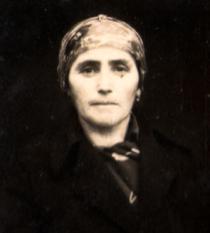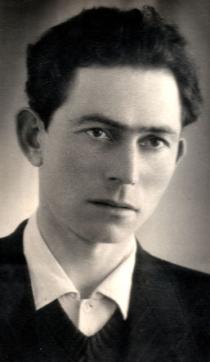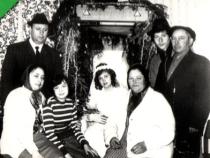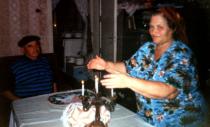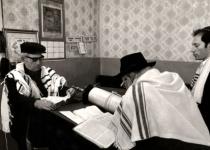This photo of me was taken in Khust in 1943. This photo was not lost by some miracle in our ruined house after World War II.
I was born on 25th December 1925, but the year of birth specified in my birth certificate was 1926. My Jewish name is Moishe, but in my Czechoslovak birth certificate it is Mozes and I have always been called by this name. I went to cheder like all other boys in Korolevo. I also went to a Ukrainian school. There were Jewish, Magyar, Czech and Ukrainian children in school. I never noticed any anti-Semitism. There was no anti-Semitism during the Czech rule. I studied at school and in cheder until the age of 13. At 13 I had my bar mitzvah.
In 1939 World War II began in Poland. In 1941 my father was taken to a Hungarian labor battalion. After my father left I had to quit my studies to help my mother to support the family. I had helped my father with his work before and I told my mother that I could do this work. This was my first day at work. I tried to come to the power saw bench early in the morning. The sooner I came the sooner I received my load of wood. A foreman took me to a pile of wood and told me how many logs I could take. There were no loaders. I had to carry 2.5 cubic meters of beech wood from the pile to my wagon at the distance of 25-30 meters. There I had to load them properly.
The distance to Korolevo was about 30 kilometers. On my way back I walked beside the wagon. I was holding the horses by the bridle. Of course, it would have been easier for me to hold the pole, but I was too short and wouldn’t have been able to hold the horses in this manner. When we moved along the road it was all right, but then we had to cross a narrow gauge rail track a few times where the horses jibbed.
I took the load to the village of Iza, some 5 kilometers from Korolevo, left the wagon there and took the horses home. We returned home at 2-3 o’clock in the morning. My mother gave me food and went to the stables to unharness and feed the horses.
I got up very early the next morning since I had to go to Iza and take the load to Khust. There was also a line in Khust to unload the wood onto a railcar or storage facility according to directions. Life was hard I’d say, but we enjoyed it since we could celebrate Saturday and holidays and there were no bans on religion.
My father served in his labor battalion until 1943. He fell ill with rheumatism in 1943 and was released. After he returned home my father resumed his work at the power saw bench. I began to help my mother at home and in the field. I fetched water, cut wood and took the geese to a pasture.

